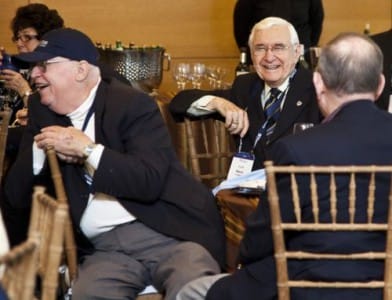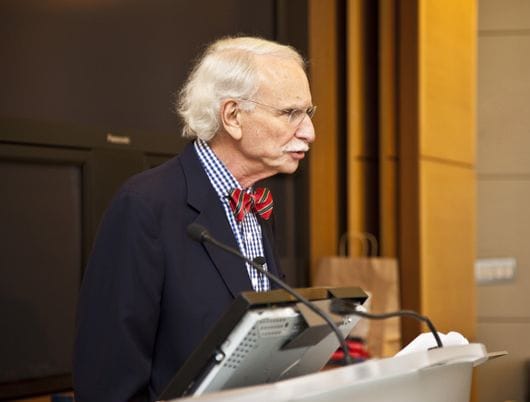The Wharton Graduate Emeritus Steering Committee has existed since 2003, and it was with noticeable pride that committee chairman John “Jack” Smith, W’51, WG’52, commenced the celebratory luncheon for the Emeritus Society on May 12, during Wharton’s MBA Reunion weekend.
“We’ve been struggling for recognition,” he said—but it appears that the Society has achieved the momentum members have been working toward. It is developing a new Wharton Graduate Emeritus Society website, which will continue to evolve over the coming months, with videos, news, event listings and digital versions of the Society’s newsletter.
During Reunion, the Society members—as well as the members of the 45th and 50th Reunion Classes—were treated to a private Lifelong Learning session, a keynote by Stephen Kobrin, WG’61, Wharton’s William H. Wurster Professor of Multinational Management and himself a member of the Emeritus Society.
Kobrin’s topic was apropos of his role as publisher and executive director of Wharton Digital Press, and it was perhaps in the best spirit of the Lifelong Learning Initiative. The topic, the confluence of technology and globalization in the rise of the emerging world, aimed to inspire fresh perspectives in audience members who lived most of their lives in the fast disappearing realities of the postwar world.
As Kobrin kidded to the audience about his current students, today when he uses the word “postwar” in class, he has to explain that he means “post-World War II,” not post-Afghanistan or post-Iraq.
What today’s students know intuitively, however, is the impact that digital technology has had upon the world.
“It really changes the way our world is organized,” Kobrin said.

Society members enjoy the luncheon at Reunion. Photo credit: Courtney Apple.
The days of closed borders are gone, he continued, which is not necessary good because the world might not know how to function without borders. Given the perceived decline of the West and the rise of emerging economies in the East and the South, international cooperation could be the most challenging to come by at a time in the postwar period when it’s needed most, the professor said.
Today’s students might take the dynamic and uncertain geopolitical and economic situation for granted, given most grew up in the shadow of 9/11. For gentlemen and ladies in their 70s and 80s, a digital world without borders could still take adjusting to.
Yet at a certain moment in the presentation, an attendee’s cellphone rang.
“This feels just like class,” Kobrin joked, “but I can’t yell at you.”
Perhaps the 45th and 50th Reunion Classes aren’t so different from the Class of 2012 after all.
Editor’s note: Also read our recently published Q&A with Wharton Graduate Emeritus Steering Committee Chairman Jack Smith.

























